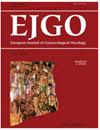PI3K inhibitor promotes tumor vessel normalization and improves treatment outcomes of breast cancer with doxorubicin
IF 0.5
4区 医学
Q4 OBSTETRICS & GYNECOLOGY
引用次数: 0
Abstract
HS-173 is a specific inhibitor of the Phosphoinositide 3-Kinase α (PI3Kα) subtype. Although it was shown to potentially inhibit tumor angiogenesis, experimental validation studies are still needed. This study provides an experimental basis for the role of HS-173 in breast cancer. A mouse model of subcutaneous transplantation breast cancer was constructed. The mice were treated with different concentrations of HS-173. Immunohistochemical staining was used to detect tumor microvessel density, and the appropriate concentration was determined. Immunofluorescence was used to detect the morphology integrity of tumor vessels’ lumen, transmission electron microscopy to detect tight junctions between endothelial cells and the integrity of the basement membrane, Doppler ultrasound to detect tumor blood perfusion, and small animal live imaging to detect the penetration of doxorubicin in the tumor tissues. After HS-173 treatment, the number of tumor interstitial microvessels decreased, the lack of tumor vascular lumen was reduced, and the continuity and integrity of the vascular lumen were increased. Vascular endothelial cells showed complete morphology with good tight junctions. The extracellular matrix was rich in components and tended to form basement membranes. HS-173 also increased the blood perfusion in the tumor tissue compared with the doxorubicin treatment alone. Further, the fluorescence signal intensity of the tumor tissue doxorubicin was significantly enhanced after HS-173 treatment. The PI3K inhibitor HS-173 showed promising potential in inhibiting tumor angiogenesis and improving the structure and function of blood vessels in the tumor microenvironment.PI3K抑制剂促进肿瘤血管正常化,改善阿霉素治疗乳腺癌的效果
HS-173是磷酸肌肽3-激酶α (PI3Kα)亚型的特异性抑制剂。虽然它被证明可能抑制肿瘤血管生成,但仍需要实验验证研究。本研究为HS-173在乳腺癌中的作用提供了实验依据。建立小鼠皮下移植乳腺癌模型。用不同浓度的HS-173处理小鼠。免疫组化染色检测肿瘤微血管密度,确定适宜浓度。采用免疫荧光检测肿瘤血管管腔形态完整性,透射电镜检测内皮细胞与基底膜紧密连接完整性,多普勒超声检测肿瘤血液灌注,小动物活体成像检测阿霉素在肿瘤组织中的渗透情况。HS-173治疗后,肿瘤间质微血管数量减少,肿瘤血管管腔缺失减少,血管管腔连续性和完整性增强。血管内皮细胞形态完整,紧密连接良好。细胞外基质成分丰富,易于形成基底膜。与单独使用阿霉素治疗相比,HS-173也增加了肿瘤组织的血液灌注。此外,HS-173治疗后肿瘤组织的荧光信号强度明显增强。PI3K抑制剂HS-173在抑制肿瘤血管生成、改善肿瘤微环境血管结构和功能方面显示出良好的潜力。
本文章由计算机程序翻译,如有差异,请以英文原文为准。
求助全文
约1分钟内获得全文
求助全文
来源期刊
自引率
25.00%
发文量
58
审稿时长
1 months
期刊介绍:
EJGO is dedicated to publishing editorial articles in the Distinguished Expert Series and original research papers, case reports, letters to the Editor, book reviews, and newsletters. The Journal was founded in 1980 the second gynaecologic oncology hyperspecialization Journal in the world. Its aim is the diffusion of scientific, clinical and practical progress, and knowledge in female neoplastic diseases in an interdisciplinary approach among gynaecologists, oncologists, radiotherapists, surgeons, chemotherapists, pathologists, epidemiologists, and so on.

 求助内容:
求助内容: 应助结果提醒方式:
应助结果提醒方式:


